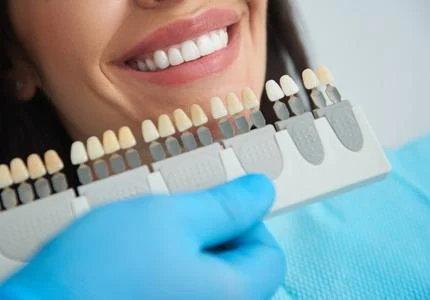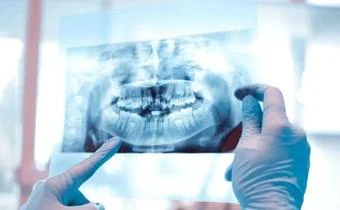Contact now to benefit from special opportunities for you.

Dental crowns, simply put, are fixed prostheses that are placed over existing teeth. Before the procedure, your natural teeth are carefully shaped to accommodate the crowns, which encase them entirely. Dental crowns can be utilized in various cases, including implant treatment and the Hollywood Smile procedure. If you're interested in discovering more about the process of getting dental crowns, continue reading!
To begin with, your teeth or implants will be carefully shaped or prepared to align with your specific treatment plan. Following this, precise measurements of your prepared teeth or implants will be taken and forwarded to the laboratory. The laboratory will then craft your custom crowns under the guidance of your dentist’s instructions. In the final stage, these crowns, also known as fixed prostheses, will be securely attached to your teeth. It’s important to note that the exact process may vary based on your specific dental treatment.
There are many reasons to have dental crowns in Turkey. We have listed some of them for you:

Three reasons to come on this journey with us
Our dentistry procedures offer long-lasting and permanent results, allowing you to enjoy natural-looking teeths for years to come.
With our advanced techniques and skilled surgeons, we prioritize your comfort throughout the dental treatments, ensuring a virtually painless experience.
We prioritize patient satisfaction and strive to exceed your expectations. Our dedicated team ensures that you receive personalized care and support throughout your dental treatment journey.
Prior to the fabrication of dental crowns, comprehensive X-ray images of your teeth and jaw are obtained using state-of-the-art imaging equipment. These detailed images enable our specialist doctors to assess your dental condition thoroughly. Additionally, any necessary tests will be conducted to ensure an accurate diagnosis and treatment plan.

To prepare your teeth for dental crowns, they are carefully shaped to create a suitable foundation. This involves removing a small amount of tooth structure from all sides, known as cutting 360 degrees, to accommodate the crown. In the case of implant treatment, precise measurements are taken to ensure compatibility with the implants.
When it comes to the material used for crafting the crowns, options like Zirconium or E-MAX are utilized. These high-quality materials are known for their strength and aesthetic appeal, ensuring the production of durable and natural-looking crowns.

Once the crowns are placed, you can resume eating and drinking once the effects of the anesthesia wear off. Your dentist will provide you with specific instructions regarding the post-treatment care based on your individual treatment plan. It’s important to follow their guidance for the most accurate information on what to expect and how to care for your new crowns.

The operation may vary from person to person but usually
| PROCEDURE DURATION | 2-3 Dental Visits |
| ANESTHESIA | Local Anesthesia |
| RECOVERY TIME | 4-6 Months for veneers to fit |
| ACCOMODATION | 2-3 Days |
| PREFERRED METHOD | Depends on the Patient |

Ask a question to us. Our medical consultant will reach you as soon as possible for more information.
Some of the questions our patients often ask us
A dental crown is necessary when the enamel, which acts as a protective covering for the tooth, is no longer able to fulfill its function. In such cases, a dental crown serves as a replacement for the enamel to restore the tooth’s functionality.
A significant number of individuals have dental anxiety due to concerns about potential pain during dental procedures, including getting a crown. However, it is important to note that the process of getting a crown is typically painless, ensuring a comfortable experience from start to finish. Your dentist will administer local anesthesia to numb your mouth before any filling or fitting is performed, ensuring minimal discomfort throughout the procedure.
A dental crown is a personalized and permanent dental restoration. It resembles a hollow, tooth-shaped “cap” that is placed over a prepared natural tooth. Once securely cemented, the crown fully encloses the visible portion of the tooth, extending from the gum line and above it.
When a skilled dentist places a crown, it is considerably stronger than a filling and less prone to becoming loose or needing repairs. Crowns restore natural function, allowing for normal chewing ability. In contrast, fillings can alter the shape of the tooth and potentially affect chewing negatively.
After receiving anesthesia, it typically takes around four hours before you feel comfortable eating and chewing food. When you have permanent crowns, it is advisable to avoid sticky and hard foods for the first 24 hours. However, after this initial period, you can resume normal eating, drinking, and tooth cleaning.
Porcelain crowns tend to be more expensive compared to gold crowns due to the additional time and effort involved in their fabrication. On average, the cost of porcelain, porcelain-fused-to-metal, and gold crowns ranges from $2000 to $5100.
After getting a dental crown, the recovery period usually lasts a few days. It’s common for patients to experience mild inflammation, sensitivity, and irritation in the treated area, but these symptoms should diminish within one to two weeks. To alleviate swelling of the gums, it is advised to rinse your mouth with warm salt water several times a day.
The primary reason for removing a dental crown is when decay has developed beneath it. In some cases, the cavity may be so severe that the entire crown needs to be removed. Additionally, if the underlying root is infected, a root canal treatment may be necessary. Dental crowns can also be prone to breaking or chipping, which may require their removal.
